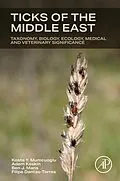Ticks of the Middle East: Taxonomy, Biology, Ecology, Medical and Veterinary Significance consolidates the knowledge of ticks and tick-borne diseases in the Middle East region, with particular emphasis on their taxonomy, synonyms, distribution, ecology, and medical and veterinary significance. This book explores the history of tick research and the geoclimatic conditions of Middle Eastern countries. It also provides distribution maps of each tick species within the Middle East region and a list of ticks found in each country. Written by an international team of experts in the field, Ticks of the Middle East: Taxonomy, Biology, Ecology, Medical and Veterinary Significance provides a concise and authoritative resource on tick species in the region. - Covers ticks and tick-borne diseases in the Middle East countries of Bahrain, Egypt, Iran, Iraq, Israel, Jordan, Kuwait, Lebanon, Oman, Qatar, Saudi Arabia, Syria, the Palestinian Territories, the United Arab Emirates, Türkiye, and Yemen. - Discusses the medical and veterinary aspects of ticks and their transmitted pathogens. . Provides taxonomic keys for the morphological identification of tick genera and the 72 ixodid and 29 argasid ticks found in the region. - Presents the molecular reference data for each ixodid and argasid tick included in this book, giving the accession numbers for the various genes available, along with the locality from which the sample sequences were derived.
Autorentext
Kosta Y. Mumcuoglu, PhD, currently works at the Department of Microbiology and Molecular Genetics, Hebrew University of Jerusalem, Israel. Kosta does research in Medical and Veterinary Entomology, as well as in Biotherapy (Maggot debridement therapy and Hirudotherapy). His main subjects of interest are lice and louse-borne diseases, lice in archaeological remains, fleas, midges, bed bugs, Demodex, Scabies and house-dust mites, ticks and tick-borne diseases, the use of maggots for the treatment of chronic wounds, and the use of leeches in plastic surgery.Adem Keskin, PhD, is an Associate Professor at Gaziosmanpasa University. His research focuses on ticks (Ixodida) and fleas (Siphonaptera) systematics, host-parasite relationships, molecular detection of tick and flea borne diseases, and the role of wild animals in the transmission of zoonotic agents.Professor Ben Mans has worked at the Agricultural Research Council - Onderstepoort Veterinary Research since 2008 where he has held a number of research positions, currently as Principal Researcher and Research Team Manager. He is also a Professor Extraordinarius at the University of South Africa. He received his Honours, Master's and PhD degrees in Biochemistry from the University of Pretoria (UP) and completed Postdoctoral Fellowships at UP, the National Centre for Biotechnology Information (NCBI), and the Laboratory for Malaria and Vector Research at the National Institutes of Health (NIH, USA). His research focuses on tick biology and evolution, specifically adaptation to a blood-feeding lifestyle at the tick-host interface, tick taxonomy and systematics. He has published 110 peer-reviewed articles with over 6 800 citations. In addition, he has authored and co-authored 17 book chapters and has served on the Editorial Boards of PLoS One, the International Journal of Acarology, and Ticks and Tick-borne Diseases.Filipe Dantas-Torres MV, MSc, DSc, PhD, FRES, Dipl EVPC is a researcher at Fiocruz-PE, Brazil. He is a veterinarian and holds a Master of Science and Doctor of Science degrees in public health and a PhD in animal health and zoonosis. He is a Fellow of the Royal Entomological Society and a Diplomate of the European College of Veterinary Parasitology. He is Editor-in-Chief of Parasites and Vectors.
